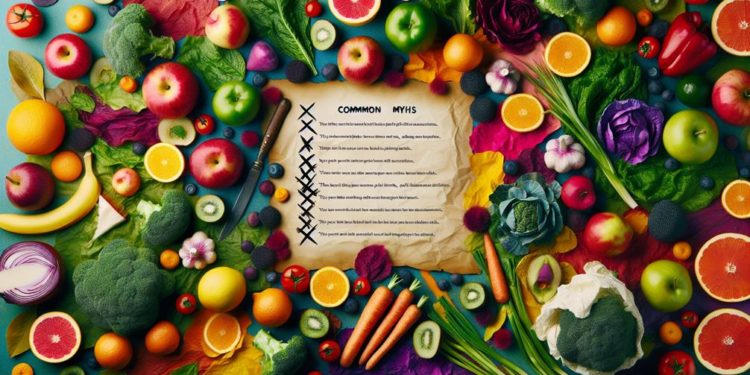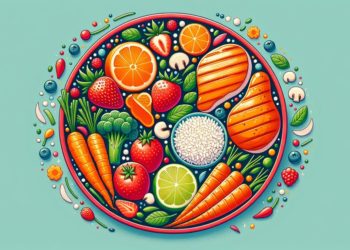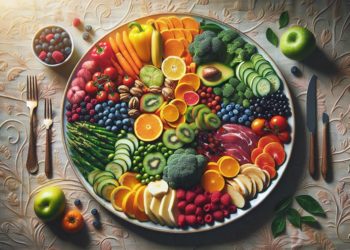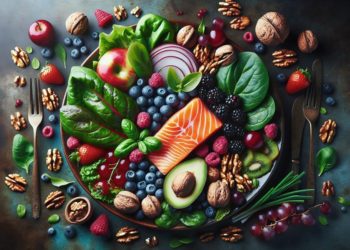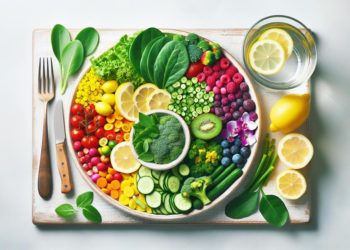Did you know that approximately 5% of the adult population in the United States follows a vegetarian diet? Despite its growing popularity, there are still many misconceptions surrounding this lifestyle choice. From concerns about protein deficiency to doubts about the adequacy of essential nutrients, it's time to separate fact from fiction. In this discussion, we will debunk common myths surrounding vegetarian diets, explore the health benefits, and shed light on the environmental advantages. Prepare to challenge your assumptions and discover the truth about vegetarianism.
Key Takeaways
- Vegetarian diets can provide all the necessary nutrients when properly planned
- Batch cooking and meal prep can save time and make vegetarian eating more convenient
- Vegetarian diets can incorporate seasonal produce for freshness and nutritional value
- Vegetarian diets can meet the recommended protein intake when properly planned
Protein: Debunking the Myth of Vegetarian Protein Deficiency
Don't believe the myth that a vegetarian diet lacks sufficient protein; the evidence overwhelmingly shows that you can easily meet your protein needs without consuming meat. Many people assume that meat is the best, or even the only, source of protein. However, there are numerous vegan alternatives and plant-based protein sources that provide all the essential amino acids your body needs.
Legumes, such as lentils, chickpeas, and black beans, are excellent sources of protein. They are not only packed with protein but also high in fiber, iron, and other essential nutrients. Tofu and tempeh, made from soybeans, are also great options, as they are versatile and can be used in a variety of dishes.
Nuts and seeds, like almonds, chia seeds, and hemp seeds, are not only tasty snacks but also rich in protein. They are also high in healthy fats, fiber, and antioxidants. Quinoa, a grain-like seed, is another complete protein source that contains all nine essential amino acids.
In addition to these vegan alternatives, there are plant-based protein powders available on the market. These powders, derived from sources like peas, brown rice, and hemp, can easily be added to smoothies or other recipes to boost protein intake.
The key to meeting your protein needs on a vegetarian diet is to consume a variety of these plant-based protein sources throughout the day. By doing so, you can ensure that you are getting all the essential amino acids your body requires for optimal health.
Nutrients: Understanding the Adequacy of a Vegetarian Diet
To ensure that a vegetarian diet is nutritionally adequate, it is important to understand the key nutrients that may require special attention or consideration. While there are concerns about deficiency in a vegetarian diet, addressing these concerns can help ensure that you are getting all the necessary nutrients.
- Vitamin B12: This vitamin is primarily found in animal products, which is why it is often associated with a deficiency in vegetarian diets. However, there are vegetarian sources of vitamin B12, such as fortified plant-based milks, cereals, and nutritional yeast. Including these foods in your diet can help meet your vitamin B12 needs.
- Iron: Contrary to the misconception that vegetarian diets lack adequate iron intake, plant-based sources can provide sufficient amounts of this essential mineral. Foods like legumes, tofu, spinach, and quinoa are rich in iron. Pairing them with vitamin C-rich foods, like citrus fruits or bell peppers, can enhance iron absorption.
Health Benefits: Unveiling the Positive Impact of a Vegetarian Lifestyle
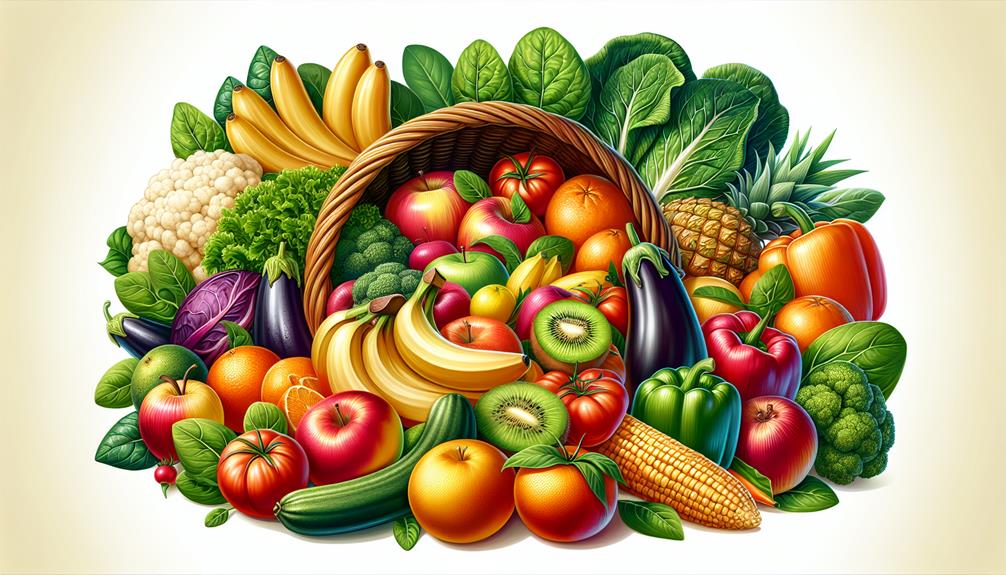
A vegetarian lifestyle offers numerous health benefits that can positively impact your overall well-being. By choosing a plant-based diet, you can improve your heart health, reduce the risk of chronic diseases, and maintain a healthy weight. One major advantage of a vegetarian diet is its positive impact on cardiovascular health. Research has shown that vegetarians tend to have lower blood pressure, cholesterol levels, and a reduced risk of heart disease compared to non-vegetarians. Additionally, a vegetarian diet rich in fruits, vegetables, whole grains, and legumes provides essential nutrients and antioxidants that help combat inflammation and oxidative stress, both of which are linked to chronic diseases like cancer, diabetes, and obesity. Contrary to popular belief, a well-planned vegetarian diet can provide all the necessary nutrients, including protein, iron, calcium, and vitamin B12. With proper planning and food choices, vegetarians can easily meet their nutritional needs. In fact, studies have shown that vegetarians often have lower body mass indexes (BMI) and are less likely to be overweight or obese compared to non-vegetarians. So, by adopting a vegetarian lifestyle, you can enjoy the positive impact it has on your well-being while debunking any concerns about potential health risks.
Sustainability: Exploring the Environmental Advantages of Vegetarianism
By adopting a vegetarian lifestyle, you can contribute to a more sustainable future by exploring the environmental advantages of plant-based eating. Plant-based diets have a significantly lower environmental impact compared to diets that include meat and dairy products. Here are three key ways in which vegetarianism helps reduce your carbon footprint:
- Reduced greenhouse gas emissions: Livestock farming, particularly beef and lamb production, is a major contributor to greenhouse gas emissions. The production of meat and dairy products requires large amounts of land, water, and energy. By choosing plant-based alternatives, you can reduce your carbon footprint and help mitigate climate change.
- Conservation of natural resources: Animal agriculture is a highly inefficient process that requires vast amounts of land, water, and feed. The production of meat and dairy products requires significantly more resources compared to plant-based foods. By adopting a vegetarian diet, you can help conserve these valuable resources and reduce the strain on the environment.
- Preservation of biodiversity: The expansion of livestock farming has led to deforestation and habitat destruction, resulting in the loss of biodiversity. By choosing plant-based foods, you can help protect and preserve natural habitats, allowing ecosystems to thrive and support diverse plant and animal species.
Practical Tips: Overcoming Challenges and Embracing a Vegetarian Diet

Overcoming the challenges and embracing a vegetarian diet can be achieved through practical tips that make the transition easier and more enjoyable. One of the common challenges faced by individuals when switching to a vegetarian diet is overcoming cravings for meat. However, with a little planning and creativity, you can find satisfying alternatives that will help curb those cravings. Incorporating a variety of plant-based proteins, such as beans, lentils, tofu, and tempeh, into your meals can provide the necessary nutrients and help keep you feeling full and satisfied. Additionally, experimenting with different herbs, spices, and marinades can add a burst of flavor to your dishes, making them more enjoyable.
Meal planning is another essential aspect of successfully adopting a vegetarian diet. Planning your meals in advance can help ensure that you have all the necessary ingredients on hand and prevent last-minute temptations to deviate from your dietary goals. Consider creating a weekly meal plan and grocery list to make shopping easier and more efficient. Additionally, batch cooking and meal prepping can save time and effort during busy weekdays. By preparing larger portions and freezing leftovers, you can have healthy and delicious meals ready to enjoy whenever you need them.
To further emphasize the importance of meal planning, here is a table that illustrates the benefits and tips for effective meal planning:
| Benefits of Meal Planning | Tips for Effective Meal Planning | Common Mistakes to Avoid |
|---|---|---|
| Saves time and money | Create a weekly meal plan | Not considering dietary preferences or restrictions |
| Reduces food waste | Make a grocery list | Overcomplicating recipes |
| Promotes healthier choices | Batch cook and meal prep | Ignoring seasonal produce |
Frequently Asked Questions
Are There Any Health Risks Associated With a Vegetarian Diet?
You might wonder about the potential health risks of a vegetarian diet. It's important to note that while there can be nutritional deficiencies, with proper planning and a variety of foods, these risks can be minimized.
Can a Vegetarian Diet Provide Enough Energy for Physical Activity and Exercise?
A vegetarian diet can provide enough energy for physical activity and exercise. By implementing nutritional strategies for maximizing energy and exploring the benefits of plant-based protein sources, you can support athletic performance on a vegetarian diet.
Can a Vegetarian Diet Be Suitable for Children and Teenagers?
A vegetarian diet can be suitable for children and teenagers, but it's important to consider the pros and cons. While it can provide essential nutrients, like fiber and vitamins, parents should monitor growth and development to ensure adequate nutrition.
What Are the Potential Drawbacks or Disadvantages of Following a Vegetarian Lifestyle?
Following a vegetarian lifestyle may present potential challenges and nutritional considerations. It's important to ensure you're getting adequate protein, iron, vitamin B12, and omega-3 fatty acids from plant-based sources or supplements.
How Can I Ensure I Am Getting Enough Iron and Other Essential Nutrients on a Vegetarian Diet?
To ensure you're getting enough iron and other essential nutrients on a vegetarian diet, focus on incorporating iron-rich plant-based foods like beans, lentils, tofu, spinach, and fortified cereals. It's important to eat a varied and balanced diet to meet your nutrient needs.
Conclusion
In conclusion, debunking the myths surrounding a vegetarian diet is essential to understanding its true benefits. By addressing concerns about protein deficiency, highlighting the adequacy of nutrients, revealing the positive impact on health, and exploring the environmental advantages, we can dispel common misconceptions. Embracing a vegetarian lifestyle not only promotes personal well-being but also contributes to a more sustainable world. So, why not join the growing movement and reap the rewards of a plant-based diet?


